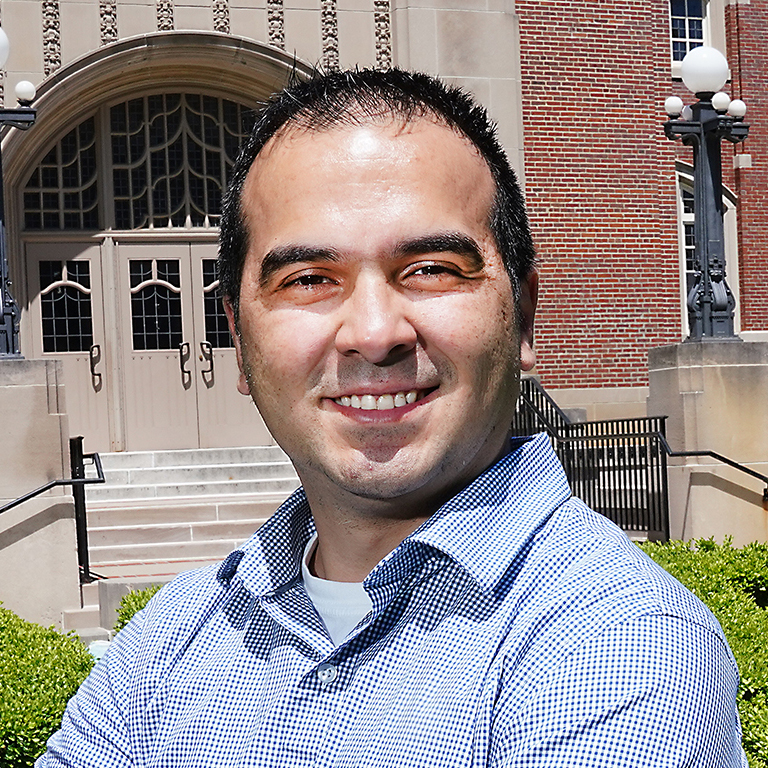A research focus on maritime shipping gives Manuel a unique perspective into recent supply chain disruptions.
“While working at the think tank, I did a press article analyzing commodities trade between Colombia and China, which combined international trade with geography. I was super interested and knew that if I love the topic, I’m going to do my very best.”
 When a ship ran aground and blocked the Suez Canal for six days in March, stranding more than 400 ships at one of the world's busiest waterways, Manuel Jimenez was especially attuned to its impact. Jimenez’s research at Purdue focuses on maritime shipping and international trade — topics that reflect his upbringing in Bogotá, Colombia, where his father operated a firm that exported flowers to the U.S. After earning bachelor’s and master’s degrees in economics at Los Andes University, Jimenez spent five years as an economic researcher at Asociación Nacional de Instituciones Financieras (ANIF). As he monitored and analyzed the impact of international trade on Colombia’s agricultural sector, he realized that the country was falling short in capitalizing on global population growth. “People were growing exponentially, but agricultural production was not,” he explains. “I was trying to become an expert to contribute, but I needed more preparation, a more global perspective.” Although he explored many PhD programs, he had visited his sister at Purdue during her chemical engineering studies and was drawn to the agricultural economics department’s top-tier reputation for applied research. He arrived at Purdue in 2014, completed a second master’s degree and began doctoral work in August 2016 under the guidance of Russell Hillberry, professor of agricultural economics.
When a ship ran aground and blocked the Suez Canal for six days in March, stranding more than 400 ships at one of the world's busiest waterways, Manuel Jimenez was especially attuned to its impact. Jimenez’s research at Purdue focuses on maritime shipping and international trade — topics that reflect his upbringing in Bogotá, Colombia, where his father operated a firm that exported flowers to the U.S. After earning bachelor’s and master’s degrees in economics at Los Andes University, Jimenez spent five years as an economic researcher at Asociación Nacional de Instituciones Financieras (ANIF). As he monitored and analyzed the impact of international trade on Colombia’s agricultural sector, he realized that the country was falling short in capitalizing on global population growth. “People were growing exponentially, but agricultural production was not,” he explains. “I was trying to become an expert to contribute, but I needed more preparation, a more global perspective.” Although he explored many PhD programs, he had visited his sister at Purdue during her chemical engineering studies and was drawn to the agricultural economics department’s top-tier reputation for applied research. He arrived at Purdue in 2014, completed a second master’s degree and began doctoral work in August 2016 under the guidance of Russell Hillberry, professor of agricultural economics.
“Maritime shipping is critical for global supply chains, including agriculture,” Jimenez says. “Agricultural commodities are highly dependent because they are heavily traded products and typically have high weight-to value ratios, which makes other modes of transportation uneconomical,” he adds. After the container revolution, a key development in transportation that standardized both containers and port technology in the second half of the last century, “shipping hubs evolved, and this sector became the backbone for international trade,” he says. His research examines international cargo shipping, global value chains, and trade costs. For example, in one of his projects, Jimenez studied carriers’ market power by quantifying the margins they charge for shipping products to the U.S. In another, he quantified welfare benefits of shipping hubs and the intermediate transit through them, easing global trade and connecting most places in the world.
Jimenez says he relies on his advisor for hands-on help: “Whenever I have a problem, he’ll say, ‘let’s try to think together.’” Jimenez discovered an affinity for teaching in his home country and further developed it at Purdue, starting as a Spanish instructor in the School of Languages. Most recently he assisted in Hillberry’s International Agricultural Trade course (AGEC450) and in The Macroeconomic, Trade, and Policy Environment of the Food System (AGEC682). His efforts earned his department’s Teaching Assistant Award and nomination for the 2020-2021 College of Agriculture Graduate Student Excellence in Teaching award.
Jimenez expects to complete his PhD next summer and hopes to find a research position with an international agency or private research institute in the U.S. or a developing country. “If I love what I do, everything will come,” he says. According to his wife, Jimenez jokes, he “only works,” but counts among his favorite activities time with family, cooking and enjoying food and wine, and sleeping.
